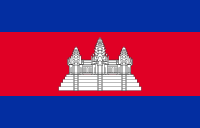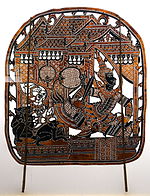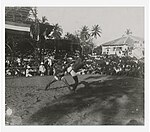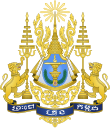List of Intangible Cultural Heritage elements in Cambodia

The United Nations Educational, Scientific and Cultural Organisation (UNESCO) intangible cultural heritage elements are the non-physical traditions and practices performed by a people. As part of a country's cultural heritage, they include celebrations, festivals, performances, oral traditions, music, and the making of handicrafts.[1] The "intangible cultural heritage" is defined by the Convention for the Safeguarding of Intangible Cultural Heritage, drafted in 2003[2] and took effect in 2006.[3] Inscription of new heritage elements on the UNESCO Intangible Cultural Heritage Lists is determined by the Intergovernmental Committee for the Safeguarding of Intangible Cultural Heritage, an organisation established by the convention.[4]
To date, there are 6 intangible cultural heritages of Cambodia have been inscribed on the list. Four elements are on the Representative List of Intangible Cultural Heritage of Humanity, and two elements are on the List of Intangible Cultural Heritage in Need of Urgent Safeguarding.
Intangible Cultural Heritage elements
[edit]Representative List
[edit]| Name | Image | Year proclaimed | Year inscribed | No. | Description |
|---|---|---|---|---|---|
| Royal ballet of Cambodia | 
|
2003 | 2008 | 00060 | Royal Ballet of Cambodia, aka Khmer Classical Dance, is a form of performing arts that has been associated with the Khmer royal court for more than a thousand years. Khmer classical dance renowned for its graceful hand gestures and stunning costumes. Performances would traditionally accompany royal ceremonies and observances such as coronations, marriages, funerals or Khmer holidays. There have four main types of roles in the Khmer classical dance: Neay Rong (the male), Neang (the female), Yeak (the giant), and the Sva (the monkey). The dance is accompanied by the traditional Pinpeat orchestra. |
| Sbek Thom, Khmer shadow theatre | 
|
2005 | 2008 | 00108 | Sbek Thom is a Khmer shadow theatre that featuring 2 meters high. The theatre is believed to date back since before the Angkorian period. The performances could only take place on specific occasions three or four times a year, such as the Khmer New Year, the King’s birthday or the veneration of famous people. The Sbek Thom performances is accompanied by the Pinpeat orchestra, and usually perform the epic of Reamker, Khmer version of Indian Ramayana. |
| Tugging rituals and games | 2015 | 01080 | Known in Khmer language as L'beng Teanh Prot, which is linked to Khmer tradition and culture and historically valuable evidence that can be seen through the carvings on the walls of many temples which tell of the Hindu myth “Churning of the Sea of Milk”. It is commonly played during Khmer New Year or Chlong Chet, a rice-related ceremony. | ||
| Kun Lbokator, traditional martial arts in Cambodia | 
|
2022 | 01868 | Kun Lbokator is an ancient Khmer martial arts dating back to at least the Angkorian period, which aims to inculcate and develop mental and physical strength and discipline in its practitioners, by mastering self-defense techniques, while promoting the philosophy of non-violence. |
Intangible Cultural Heritage in Need of Urgent Safeguarding List
[edit]| Name | Image | Year inscribed | No. | Description |
|---|---|---|---|---|
| Chapei dang veng | 
|
2016 | 01165 | Chapei Dang Veng is a type of traditional musical instrument in Cambodian society. The long-necked lute guitar is accompanied by singing which usually about traditional poems, folk tales and Buddhist stories. The Chapei is also used in Phleng Arak, Phleng Kar Boran and Mohaori orchestras. |
| Lkhon Khol Wat Svay Andet | 2018 | 01374 | Lakhon Khol is a traditional mask theatre in Cambodia. Having originated in Bhani, a type of drama, mentioned in at least 10th century inscriptions of Cambodia, Lkhon Khol today is performed by males, wearing masks and accompanied by traditional Pinpeat orchestra. It performs only episodes from Reamker, a Cambodian version of the Indian Ramayana. |
On-going Nomination
[edit]| Element | Description | Type of File | Nominate For Year |
|---|---|---|---|
| Cultural practices and expressions linked to Krama, a traditional woven textile in Cambodia | Krama is a Khmer woven textile associated with traditional practices and cultural expressions in daily life. Made of either cotton or silk with a rectangular size (1. 8 to 2 meters long), Krama has a variety of grid-pattern motifs which represent human body features. Colors of white, yellow, red, and blue are extracted from natural végétation and insects for dyeing. For the purpose of using Krama is used as a scarf, a belt, a blanket, a bandanna to cover thé face and head from thé sun, a lower garment, a cloth for décorative purposes, and a hammock for children to sleep in. | Representative List | 2024 |
List of Possibility Items for Registration in the Near Future
[edit]- Krama Khmer – The Ministry of Culture and Fine Art submitted the nomination form of Krama Khmer for inscription on the UNESCO Representative List of Intangible Cultural Heritage of Humanity on 31 March 2023.[5]
- Traditional Khmer Wedding - It has been submitted to UNESCO, and it is possibly inscribed in 2025. [6]
- Bon Choul Chnam Thmey or Sankranta , traditional Khmer New Year festival - The nomination document is being prepared by the Ministry of Culture and Fine Arts. It expected to be submitted in March 2025 for possible inscription in 2026. [7][8]
- Bon Om Touk, Cambodian Water and Moon Festival [9]
- Khleng Ek, traditional Cambodian kite[10]
- Sotr Khmer , a traditional weaving silk in Cambodia [11]
- Khmer Silverware
- Khmer traditional clothing
- Lakhon Bassac, a traditional folk music and opera in Cambodia
- Num banhchok, a tradition rice noodles in Cambodia [12]
- Phleng Arak, an ancient music in Cambodia
- Yike, a traditional folk music and theater in Cambodia
- Pleng Ka, Khmer traditional wedding music orchestra
Gallery
[edit]-
Royal Ballet dancers at Angkor Wat in 1900s
-
King Sisowath's dancers performed at the Élysée-Palace, Paris, France
-
Apsara Dancer
See also
[edit]- List of World Heritage Sites in Cambodia
- Royal Ballet of Cambodia
- Khmer shadow theatre
- Lakhon Khol
- Chapei dang veng
- Bokator
References
[edit]- ^ "What is Intangible Cultural Heritage?". UNESCO Intangible Cultural Heritage. Retrieved 13 January 2024.
- ^ "Text of the Convention for the Safeguarding of Intangible Cultural Heritage". UNESCO Intangible Cultural Heritage. Retrieved 13 January 2024.
- ^ "The States Parties to the Convention for the Safeguarding of the Intangible Cultural Heritage (2003)". UNESCO Intangible Cultural Heritage. Retrieved 13 January 2024.
- ^ "Functions of the Intergovernmental Committee for the Safeguarding of Intangible Cultural Heritage". UNESCO Intangible Cultural Heritage. Retrieved 13 January 2024.
- ^ "UNESCO joins second consultation workshop on Krama Khmer in Siem Reap". unesco.org.
- ^ "Plan to Propose Khmer Marriage to the UN Cultural Heritage List". khmertimeskh.com.
- ^ "PM moves to add Songkran to UNESCO heritage listing". phnompenhpost.com.
- ^ "Cambodia to Nominate "Songkran in Cambodia" for UNESCO Intangible Cultural Heritage List in 2025, Cambodian Scarf in 2024, PM Announces". phnompenhpost.com.
- ^ "ក្រសួងវប្បធម៌ កំពុងស្នើសុំចុះព្រះរាជពិធីបុណ្យអុំទូក ទៅក្នុងបញ្ជីបេតិកភណ្ឌពិភពលោក". cnc.com.kh.
- ^ "Ministry bids to keep Khleng Ek flying high". khmertimeskh.com.
- ^ "Culture Ministry seeks UNESCO recognition for Khmer heritage". khmertimeskh.com.
- ^ "Ministries seeking heritage status for Num Banh Chok". phnompenhpost.com.






